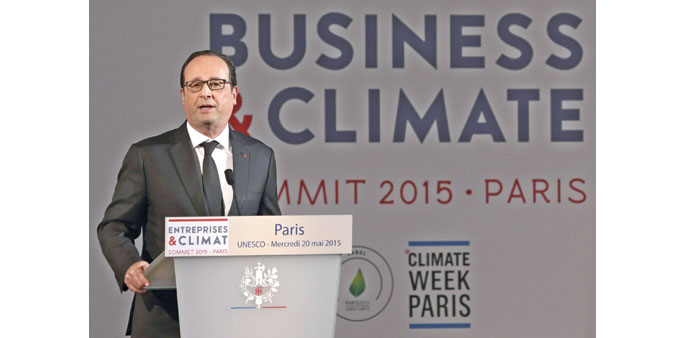Reuters
Paris
French President Francois Hollande said he was worried about a lack of progress towards a UN climate deal in Paris in December and called on the financial sector to decarbonise its investment portfolios.
Hollande said that only 37 of 196 UN member states had so far submitted plans to the UN outlining their actions to slow global warming beyond 2020.
The plans are meant to be the building blocks for a deal in Paris.
“I note and I am concerned that at the moment I am speaking there are only 37 submissions,” Hollande told the Paris Business and Climate conference where global CEOs are discussing how the world of industry can help fight climate change.
“The contributions should in theory be submitted this summer,” he added.
He said that developed nations should lead the way. Japan and Australia are the two biggest developed nations that have yet to submit - the US, the 28-nation European Union, Russia and Canada are among those that have done so.
The UN has set a deadline of October 1 for submissions to give time to add up the offers from all countries as part of a deal in Paris in December to see how far they will work to rein in rising temperatures.
“Ideally there would be an agreement well before December,” Hollande said.
Hollande also called on the financial industry to decarbonise its investment portfolios and boost the issuance of green bonds to finance investment in renewable energies.
“We have a number of expectations for the financial industry, not yet requirements, but expectations,” said Hollande, who called the world of finance his enemy during his 2012 election campaign.
He said that a decarbonisation coalition set up during the New York UN summit last year had already led to $45bn of decarbonisation commitments.
“These commitments are voluntary and are made in an open world economy. It is up to companies to understand why this makes sense,” he said.
He said all industrial sectors need to set targets to reduce emissions, but boosting the share of renewables, cutting reliance on fossil fuels and by reducing the use of water and commodities in their production processes.
At the summit, seeking to promote more action by businesses about six months before the Paris meeting, many speakers urged a price on carbon dioxide to put pressure to cut emissions from burning fossil fuels.
“We know who the enemy is - this is carbon,” said Angel Gurria, Secretary General of the Organisation for Economic Cooperation and Development. “We should hit it on the head with a blunt instrument as hard as possible ... a big fat price.”
Eldar Saetre, chief executive of Norwegian oil major Statoil , said that business as usual is not an option.
“What is really important is that we have a system where what we don’t like, carbon emissions, are priced into the energy system.”
Some studies suggest that the fight against climate change can help promote economic growth, rather than hold it back, especially when counting benefits ranging from less air pollution to cleaner water.
“Countries are doing this not to save the planet but because it is in their national interest. That is the most powerful driving force,” said Christiana Figueres, head of the UN Climate Change Secretariat.

French President Francois Hollande speaks at the ‘Business and Climate Summit 2015’ at the Unesco headquarters in Paris yesterday.
